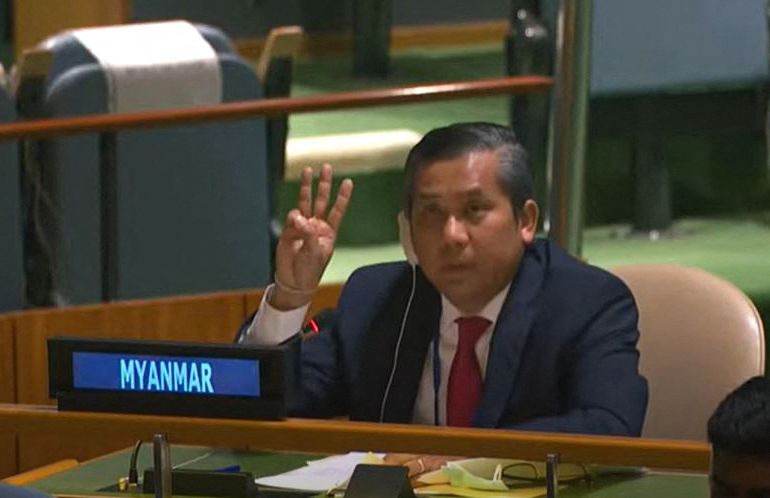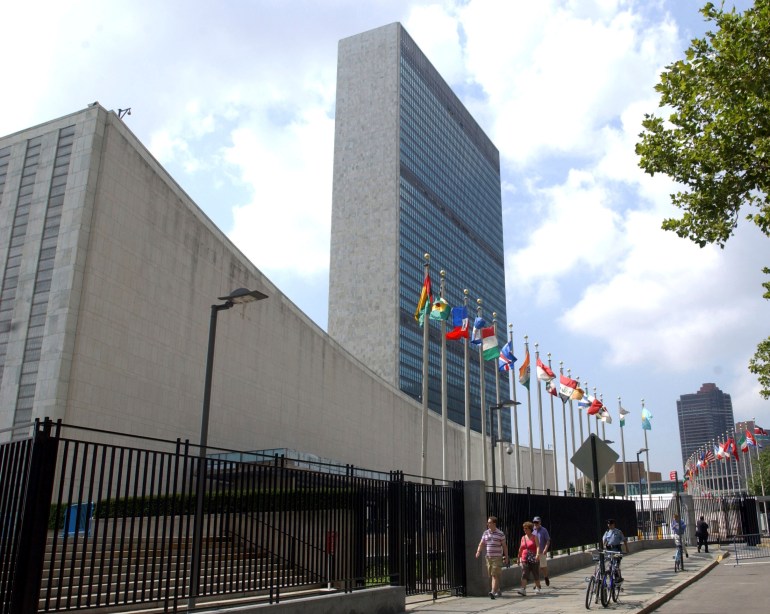Myanmar will not address world leaders at UN General Assembly
Russia and China have reportedly agreed to allow Kyaw Moe Tun to keep Myanmar’s UN seat as long as he does not speak during high-level meeting.

No representative from Myanmar is scheduled to address the annual high-level United Nations General Assembly next week, a UN spokesman said, amid rival claims for the country’s UN seat in New York after a military coup deposed the elected government.
“At this point, Myanmar is not speaking,” UN spokesman Stephane Dujarric said on Friday.
Keep reading
list of 3 itemsMany flee as army ‘torches’ homes in Myanmar’s Sagaing region
Myanmar’s Aung San Suu Kyi pleads not guilty in incitement trial
Myanmar’s current UN Ambassador Kyaw Moe Tun – appointed by Aung San Suu Kyi’s elected government – had initially been expected to address the 193-member General Assembly on Monday, the final day of the gathering.
But diplomats said China, Russia and the United States had reached an understanding, where Moscow and Beijing will not object to Kyaw Moe Tun remaining in Myanmar’s UN seat for the moment as long as he does not speak during the high-level meeting.
“I withdrew from the speaker list, and will not speak at this general debate,” Kyaw Moe Tun told Reuters the news agency, adding that he was aware of the understanding between some members of the UN credentials committee, which includes Russia, China and the US.
Myanmar’s military government has put forward military veteran Aung Thurein to be its UN envoy, while Kyaw Moe Tun has asked to renew his UN accreditation, despite being the target of a plot to kill or injure him for his opposition to the February coup.
UN accreditation issues are dealt with by a nine-member committee, whose members include the US, China and Russia. It traditionally meets in October or November.
Until a decision is made by the credentials committee, Kyaw Moe Tun will remain in the seats, according to the General Assembly rules. The same rule also applies to the representative of Afghanistan.
News of Kyaw Moe Tun’s absence on Monday comes as violence linked to the February 1 coup continues to displace thousands of civilians at home.
Myanmar has been in turmoil since Aung San Suu Kyi’s government was overthrown by the military in February, sparking a nationwide uprising that the military has tried to crush.
Attacks on the military have increased after lawmakers deposed by the generals called for a “people’s defensive war” earlier this month.

The latest violence was reported in Chin state and Sagaing region in the country’s northwest, with soldiers engaging in battles with armed local defence groups.
More than 1,100 civilians have been killed and nearly 8,000 arrested since the coup, according to local observers.
Coup leaders have defended its power grab by alleging massive fraud during elections in late 2020 which Aung San Suu Kyi’s National League for Democracy won by a landslide.
On Thursday, Michelle Bachelet, the UN High Commissioner for Human Rights, warned of a human rights catastrophe under military rule in Myanmar and urged the international community to do more to prevent the conflict in the country from getting worse.
“The national consequences are terrible and tragic – the regional consequences could also be profound,” she said in a statement.
“The international community must redouble its efforts to restore democracy and prevent wider conflict before it is too late.”